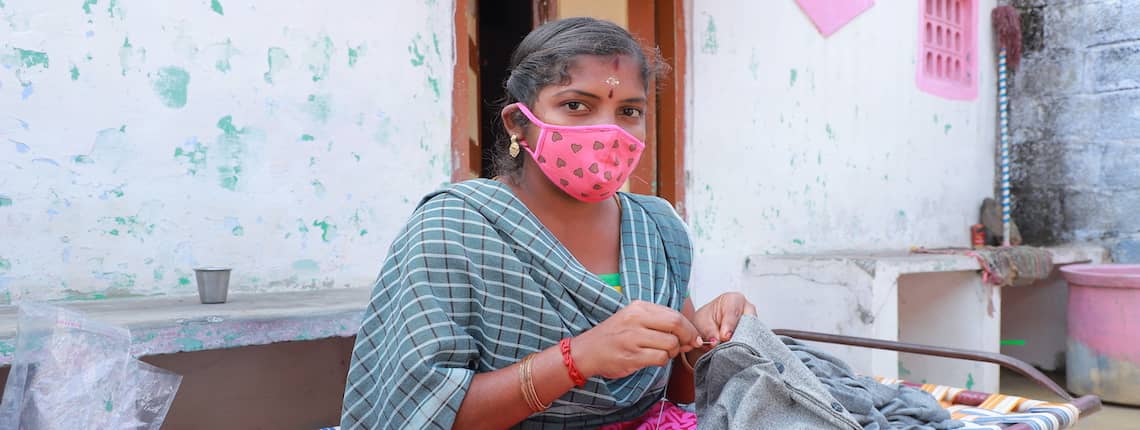It has been a year like no other. As the pandemic encompassed large swathes of the world, calls for staying home starkly emphasized the inequalities in our society. The crisis has a devastating impact on the world’s two billion informal workers. Drawn from WIEGO’s work with informal workers throughout the pandemic, we share here the valuable lessons that we learnt this past year, so that they may inform how workers are supported in the year to come.
Social Protection
Informal workers are part of the ‘missing middle’, which is often uncovered by any protection programmes that governments launched during the crisis. With most of these workers depending on their daily earnings to survive, this presented a major challenge for them and their families.
An analysis of government responses in 63 countries found two key lessons: the need for an approach flexible enough to recognize the multiple needs and dimensions of informal workers’ lives; and the importance of having systems, institutions and spaces of social dialogue in place that can support beneficiaries even when unforeseen shocks occur.
READ: Reaching the 'missing middle': Social protection for informal workers in COVID-19
Do No Harm
Many governments have justified violence against informal workers during the pandemic as necessary to enforce public health measures and to prevent the spread of the virus. These arguments form part of a long history of using public health and sanitation as a pretext for the displacement and repression of the poor.
Quite the opposite is true: with the right support and protections, informal workers have enormous potential to promote public health and economic recovery through the COVID-19 crisis and beyond. Food vending and recycling are essential services that could be enhanced through inclusion into existing food and waste systems on favourable terms. The crisis provides an opportunity to re-imagine food and waste systems and make them more equitable.
READ: Do no harm: Why harassment of informal workers hurts public health and economic recovery
Food Security
Across the global South, pandemic-related lockdowns have made accessing food a challenge for many. While grocery store workers have been deemed essential workers in many places, the poorest and most vulnerable communities often rely on informal food systems for food.
While some countries have declared informal food traders as essential service providers, they have often not gone far enough to unlock the entire informal food system.
Yet, if safety guidelines are followed, informal vendors can trade as safely as supermarkets. There is an urgent need to unlock the informal food system, end to police harassment and provide access to protective equipment and water.
READ: Food Security and Street Vendors During COVID-19
Brands’ Responsibility for Garment Workers
Since the start of the pandemic, brands have been cancelling orders, with devastating consequences for workers at the bottom of the garment supply chain, who are vulnerable and easily forgotten. Subcontracted homeworkers—women who stitch from homes for some of the leading brands, often for pennies—have been left without wages and lost payments for work already completed. Without brands taking responsibility, they are left to fend for themselves.
The CEOs of those brands need to show solidarity with the factory and homeworkers in their supply chains during this crisis. Such actions might well make the difference between life and death for the homeworkers and factory workers in their supply chains now—and help improve homeworkers’ visibility in the future.
Supporting Alternative Livelihoods
In the midst of the COVID-19 pandemic, with informal workers worldwide struggling to earn a living, the Ghanaian government began the decommissioning of Accra’s Kpone landfill site, displacing the over 300 workers who pick waste there. It seems that the government took advantage of the distraction of COVID-19 to advance the landfill’s closure, without adhering to their commitments to ensure viable livelihood alternatives or compensation for displaced workers.
Rather than prioritizing the displacement of some of the country’s most overlooked workers in the midst of a pandemic, the government should be finding ways to support the Kpone waste pickers to organize themselves and to implement inclusive waste systems. Informal waste pickers should be recognized, respected and supported by communities, state and non-state organisations, which will curtail their stigmatization and highlight their environmental, economic and social contributions to society, especially during the pandemic.
READ: Ghanaian government leaves waste pickers to fend for themselves amidst COVID-19 pandemic
Photo: Homeworker in Tiruppur, India, during the COVID-19 pandemic. credit: WIEGO
